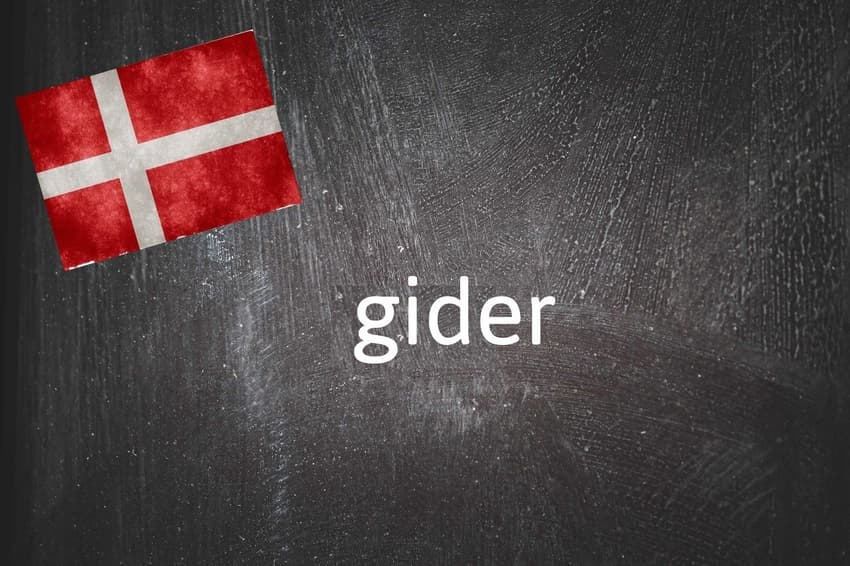Danish word of the day: Gider

Photo by Francesco Ungaro on Unsplash and Nicolas Raymond/FlickR
Here's a word that might come in useful, if you feel like reading about it.
What is gider?
Gider is the present tense of the verb at gide, which has no exact English translation but can be roughly understood as meaning either "to feel like" or "be bothered to do" something.
For example, jeg gider ikke tage opvasken ("I don't feel like doing/can't be bothered to wash the dishes") is a phrase you might hear someone say at the end of a tiring day, and it can just as easily take both the milder and stronger forms of expression in the two translations offered above.
A similar verb, at orke, is a slightly stronger version of at gide so is probably closer to "can't be bothered" than "don't feel like": Jeg orker ikke arbejde på en lørdag ("I really don't want to work on a Saturday").
It's common to hear children say gider ikke in formulations like det gider jeg ikke, which would be the equivalent to "I don't want to" in response to being asked to do a chore.
On the flip side, you can also gide godt when you are keen to partake in something. Skal vi ses til et glas vin på fredag? - Ja, det gider jeg godt ("Shall we meet for a glass of wine on Friday? - Yes, I'd like that").
Why do I need to know gider?
It's a common and very useful verb which, apart from the meanings outlined above, also has a lot of nuanced uses, particularly when it appears in its (irregular) past tense form, gad.
For example, gad vide, literally "I'd have liked to know" is a good approximation of "I wonder". Jeg gad godt vide om et menneske kunne svømme lige så hurtig som en haj ("I wonder if a human could swim as fast as a shark").
Relatedly, gad se can be used to say you'd like to see something happen in the future. Jeg gad virkelig godt se Danmark vinde VM ("I'd really like to see Denmark win the World Cup").
Returning to past tense, gider du lige can be used as a polite way of asking someone to do something and can act as a substitute for "please" in a similar way to venligst, a word we've written about previously. Gider du lige tørre bordet af, tak? means "Would you mind wiping the table please?"
Just as children say gider ikke when they don't want to do something, adults can use gider to make a request while implicitly expressing exasperation, possibly in response to disobedience or a lack of cooperation, for example: Gider du godt holde op med at drille din lillebror? - "Would you please stop teasing your little brother?"
Comments
See Also
What is gider?
Gider is the present tense of the verb at gide, which has no exact English translation but can be roughly understood as meaning either "to feel like" or "be bothered to do" something.
For example, jeg gider ikke tage opvasken ("I don't feel like doing/can't be bothered to wash the dishes") is a phrase you might hear someone say at the end of a tiring day, and it can just as easily take both the milder and stronger forms of expression in the two translations offered above.
A similar verb, at orke, is a slightly stronger version of at gide so is probably closer to "can't be bothered" than "don't feel like": Jeg orker ikke arbejde på en lørdag ("I really don't want to work on a Saturday").
It's common to hear children say gider ikke in formulations like det gider jeg ikke, which would be the equivalent to "I don't want to" in response to being asked to do a chore.
On the flip side, you can also gide godt when you are keen to partake in something. Skal vi ses til et glas vin på fredag? - Ja, det gider jeg godt ("Shall we meet for a glass of wine on Friday? - Yes, I'd like that").
Why do I need to know gider?
It's a common and very useful verb which, apart from the meanings outlined above, also has a lot of nuanced uses, particularly when it appears in its (irregular) past tense form, gad.
For example, gad vide, literally "I'd have liked to know" is a good approximation of "I wonder". Jeg gad godt vide om et menneske kunne svømme lige så hurtig som en haj ("I wonder if a human could swim as fast as a shark").
Relatedly, gad se can be used to say you'd like to see something happen in the future. Jeg gad virkelig godt se Danmark vinde VM ("I'd really like to see Denmark win the World Cup").
Returning to past tense, gider du lige can be used as a polite way of asking someone to do something and can act as a substitute for "please" in a similar way to venligst, a word we've written about previously. Gider du lige tørre bordet af, tak? means "Would you mind wiping the table please?"
Just as children say gider ikke when they don't want to do something, adults can use gider to make a request while implicitly expressing exasperation, possibly in response to disobedience or a lack of cooperation, for example: Gider du godt holde op med at drille din lillebror? - "Would you please stop teasing your little brother?"
Join the conversation in our comments section below. Share your own views and experience and if you have a question or suggestion for our journalists then email us at [email protected].
Please keep comments civil, constructive and on topic – and make sure to read our terms of use before getting involved.
Please log in here to leave a comment.